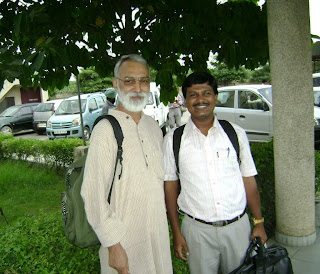The Friday Funda (TFF) No. 17, Date: 26th Aug. 2022 : Emotional Intelligence (EI) in the Indian Context
Theme: Emotional Intelligence (EI); Part – III
Emotional Intelligence (EI) in the Indian Context
(Reference N. Gayatri and K. Meenakshi, VIT University, Vellore)
The Bhagavad-Gita (The Divine Song) considered to be the fifth Veda, is lord Krishna’s moral guidance to Arjuna on the battlefield of Kurukshetra. It is considered the essence of the four Vedas (Rig, Yajur, Sama and Atharva) (Easwaran, 1995).
The Bhagavad-Gita refers to the emotionally intelligence person as a ‘Sthithapragnya’ (the emotionally stable person). A Sthithapragny, according to Krishna, is one who remains unperturbed in the face of calamity and takes good or evil with equanimity. He is neither happy when something good happens, nor is he affected when things go against him.
There are many striking similarities between Krishna’s emotionally stable person (Sthisthapragnya) and Mayer and Salovey’s emotionally intelligent person. Mayer and Salovey list as the skills pertaining to the fourth branch of their ability model (Salovey, Mayer & Caruso, 2002)
• Ability to be open to feelings, both pleasant and unpleasant
• Ability to monitor and reflect on emotions
• Ability to engage, prolong, or detach from an emotional state
• Ability to manage emotions in oneself and
• Ability to manage emotions in others
Though the Bhagavad-Gita does not speak of the fundamental requirement of emotional intelligence. It stresses the effectiveness of being able to control and manage emotions. Krishna does not merely stress on effective emotional management but first spells out the reasons that lead emotional disturbances and then moves on to the way of dealing with them. Krishna offers a systematic analysis of the problem at hand and a solution as well. Krishna’s advice becomes more practical. The course of action that he advises Arjuna is one can be followed by anyone at any place. The guidance is universal in nature and holds meaning even to present-day life.
Tracing the root cause of all emotional turmoil, Krishna identifies desire and anger as the two vices that lead an individual to his downfall.
“Thinking of objects, attachment to them is formed in a man. From attachment longing, and from longing anger grows. From anger comes delusion, and from delusion loss of memory. From loss of memory comes the ruin of discrimination, and from the ruin of discrimination, he perishes"
(Swami Swarupananda, 1996) (Bhagavad-Gita, Ch. – II, Slokas 62, 63)
The Bhagavad-Gita refers to the emotionally intelligent person as Sthithapragny (the emotionally stable person). Krishna answers Arjuna in twenty one Slokas (55 – 72) discussing in detail the qualities of an emotionally stable person.
“He whose mind is not shaken by adversity; who does not hanker after happiness, who has become free from affection, fear and wrath, is indeed the Muni of steady wisdom.”
“He who is everywhere unattached, not pleased at receiving good, nor vexed at evil, his wisdom is fixed.”
“When also, like the tortoise drawing its limbs, he can completely withdraw the senses from their objects, then his wisdom becomes steady."
(Swami Swarupananda, 1996) (Bhagavad-Gita, Ch. – II, Slokas 56, 57 & 58)
To achieve emotional stability, Krishna show the path of ‘Nishkama Karma’: action with detachment to action. As seen earlier, emotional instability stems from attachment to and a longing for a desired object. So Krishna’s advice is to detach oneself from the fruits of one’s action.
“Thy right to work only; but never to the fruits thereof. Be thou not the producer of the fruits of (thy) action; neither let thy attachment be towards inaction.”
“The wise possessed of this evenness of mind abandoning the fruits of their actions, freed for ever from the fetters of birth, go to that state which is beyond all evil.”
“In tranquillity, all sorrow is destroyed. For the intellect in him, who is tranquil minded is soon established in firmness.”
(Swami Swarupananda, 1996) (Bhagavad-Gita, Ch. – II, Slokas 47, 51 & 65)
Mulla and Krishnan (2007), in their research, pointed out that Karma Yoga and Emotional Intelligence are highly correlated.



Comments
Post a Comment